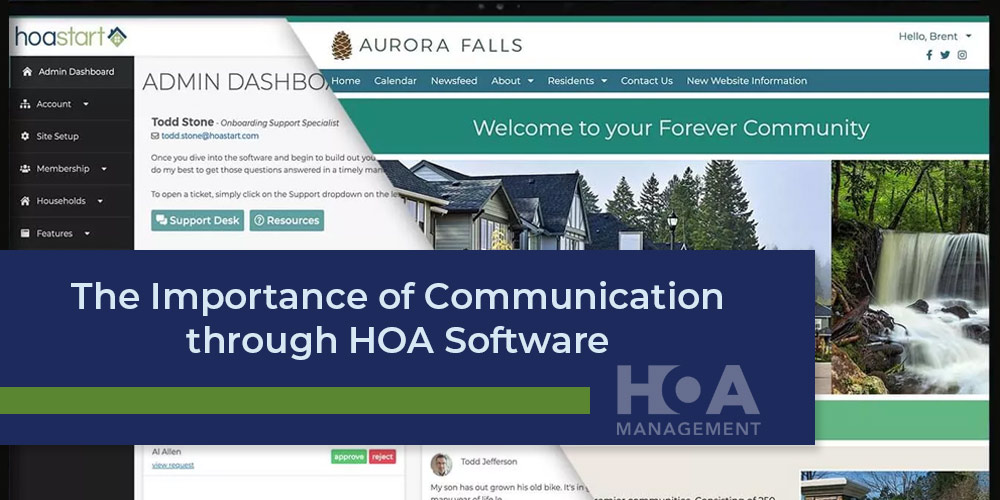The Importance Of Communication Through HOA Software

If you're on the board of a homeowners condo association, you know the importance of communication. Whether you need to announce common-area maintenance, road repairs, a community yard sale, or advertise an upcoming election, you need a tool that can communicate important happenings to your residents quickly and effectively.
Browse By Category
Sign up for Our Newsletter
If you’re on the board of a homeowners condo association, you know the importance of communication. Whether you need to announce common-area maintenance, road repairs, a community yard sale, or advertise an upcoming election, you need a tool that can communicate important happenings to your residents quickly and effectively.
Most of us recognize the need to accommodate these routine communications, but how do we handle emergencies?
When it’s urgent
What about missing pets, legal disputes that require a copy of the bylaws, or a dues payment that was debited from the wrong account and caused a property to go into collections?
Some communities resort to e-mail messages to take care of these sorts of contingencies. They set up elaborate e-mail chains to determine who updates whom, based on the nature of the emergency and the person who’s supposed to be responsible for that type of situation. These systems work when everyone involved follows the procedures, but the moment someone deviates from the plan, the entire process falls apart.
Fortunately, HOA management software can help. This HOA communication software makes it easy to broadcast announcements and send out notifications to your residents via e-mail message, phone call, or text. It also provides a secure forum for online communication, so you can share important information quickly and easily. And best of all, it’s easy to use!
Why not use third-party tools?
 When it comes to communication tools, HOAs have numerous options. Some of the most popular third-party tools include Facebook and Nextdoor, both of which are free to use, widely adopted, and work on virtually any type of device. However, both of these options have their drawbacks. For a variety of reasons, not everyone feels comfortable subscribing to these services.
When it comes to communication tools, HOAs have numerous options. Some of the most popular third-party tools include Facebook and Nextdoor, both of which are free to use, widely adopted, and work on virtually any type of device. However, both of these options have their drawbacks. For a variety of reasons, not everyone feels comfortable subscribing to these services.
Facebook can sell your personal information to advertisers, and the service does not always disclose all aspects of how it uses subscriber data. Nextdoor can become a forum for gripes and complaints, and some people find it too gossipy for their tastes.
Other options include e-mail communication tools such as Constant Contact or Mailchimp. These tools are more expensive but come with a good reputation and offer more features, such as branded templates and the ability to send messages to large groups of people.
However, they are administratively driven. That’s great if you only want a tool that enables you, your fellow administrators, and your board to communicate with members, but these tools can’t enable your members to interact directly with one another. For some communities, that’s not a problem, but others want a tool that everyone can use.
The pitfalls of third-party messaging services
If you’re using third-party communication tools to run your community, be aware of the potential for bias and disharmony. A community resident, rather than a board member, often is responsible for starting these pages. As a result, residents can begin airing their grievances and biases instead of communicating through official channels.
This can lead to tension and discord within the neighborhood. If you opt for a communications tool that integrates directly into your HOA website, you can monitor discussions and even take steps to remove posts that don’t uphold your community standards.
For example, suppose your next-door neighbor, Judy, starts a Facebook or Nextdoor page for your HOA. She begins with good intentions, but gradually, politics and extreme attitudes seep into comments on her posts. Now Judy begins to delete comments that express views she doesn’t share, and eventually blocks residents from what was supposed to be a “community” page. This can damage relationships within the neighborhood and prevent communication between neighbors.
Instead of a resident-run communications channel, you want one that your HOA either controls or at least administers. That way, you have a seat at the table and a say in how the discussions unfold.
Quite frankly, an official association Facebook or Nextdoor page never should become the sole conduit through which to provide HOA news or represent official association positions. This can wind up costing you neighborhood harmony that money can’t buy back. We’ve seen these situations blow up time and time again.
If your organization decides to use Constant Contact or Mailchimp for official communications, these tools provide you with a great way to distribute official news and bulletins. But, how do residents report a streetlight that’s out? How do they contact the board to inquire about architectural changes? How do they let the neighborhood know that they’ve found a lost cat?
Again, administrator-first tools assume that you’re only using them to broadcast news and information. They’re more suited to general business use than to the specific needs of an HOA or condominium association.
The hassles of separate software products
The examples above illustrate why states such as Florida, South Carolina, and Nevada have begun to require HOA software for transparency and communication purposes. These states understand that good communication is essential for effective association management.
However, many HOAs find themselves overwhelmed with the task of incorporating new software into their operations. They don’t have time to learn an entire group of individual tools and deal with any integration issues that pop up when they try to combine services that aren’t developed together. It’s also distracting to have to launch four or five different software products just to deal with various aspects of homeowners association communication.
The advantages of all-in-on HOA website software
 Using multiple software platforms can be cumbersome and expensive. Instead of the hassles of software integration and the time-wasting aspects of trying to make disparate tools work together, look for an all-in-one HOA website software package that puts all these communication functions—and many more capabilities—together in one cohesive package.
Using multiple software platforms can be cumbersome and expensive. Instead of the hassles of software integration and the time-wasting aspects of trying to make disparate tools work together, look for an all-in-one HOA website software package that puts all these communication functions—and many more capabilities—together in one cohesive package.
All-in-one tools that satisfy legal requirements can include features such as an intuitive website builder, document storage, password protection, member directory, newsfeed forums, private chat, amenity reservations, event registration, secure online payments, custom input forms, and much more.
With the right HOA communication software in place, HOAs can manage all their communications and operations in one place: The same place they take care of invoicing, event and amenity management, ARC tickets, and all the other essential functions of HOA business. This type of integrated software will save time and money while also ensuring transparency and compliance with state laws.
An HOA website is an important tool for increasing communication within a neighborhood. Not only does it provide a space for internal discussions, but it also allows for external communication with vendors and potential new residents. It is important to have a website that is well-designed and easy to use, as this will help foster transparency and communication within the community.
Additionally, consider placing calls to action on the website, such as contact forms, social committee inquiries, maintenance requests, and surveys. This will allow the voice of the community to be heard and help improve communication overall.
When you establish an online home for incoming and outgoing communication and information, you open the road to all members through your own digital highway. This doesn’t have to be difficult, and we can show you how. Inquire with HOA Start and let us take you on a tour.
Professionalism and diplomacy are key when discussing matters with association members. Remove emotion from the conversation and stick to facts. With HOA Start, HOA management software makes it easy to manage your community.
Written by Sally Machart
Trending Now
Related Article
Sign up for Our Monthly Newsletter
Sign up below for monthly updates on all HOA Resource

















